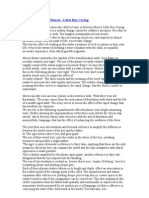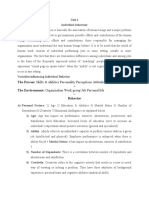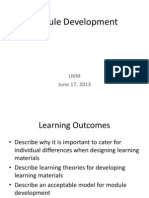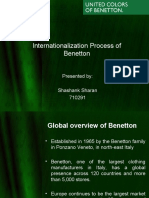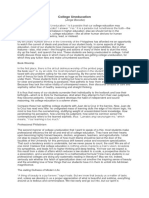0 ratings0% found this document useful (0 votes)
130 viewsNature and Process
The document discusses several topics related to organizations and human behavior, including:
1. The nature and elements of organizational culture, including observed behaviors, norms, values, rules, and climate.
2. Characteristics of a learning organization, such as having tension that drives questioning and reflection, systems thinking, and a culture that facilitates learning.
3. Key aspects of human personality and cognition, including the core personality traits of conscientiousness, emotional stability, agreeableness, extraversion, and openness to experience. Cognitive processes like learning, attitudes, perception, and attribution are also examined.
Uploaded by
ShashankCopyright
© Attribution Non-Commercial (BY-NC)
Available Formats
Download as PPT, PDF, TXT or read online on Scribd
0 ratings0% found this document useful (0 votes)
130 viewsNature and Process
The document discusses several topics related to organizations and human behavior, including:
1. The nature and elements of organizational culture, including observed behaviors, norms, values, rules, and climate.
2. Characteristics of a learning organization, such as having tension that drives questioning and reflection, systems thinking, and a culture that facilitates learning.
3. Key aspects of human personality and cognition, including the core personality traits of conscientiousness, emotional stability, agreeableness, extraversion, and openness to experience. Cognitive processes like learning, attitudes, perception, and attribution are also examined.
Uploaded by
ShashankCopyright
© Attribution Non-Commercial (BY-NC)
Available Formats
Download as PPT, PDF, TXT or read online on Scribd
You are on page 1/ 10
Nature of Organization
• Techno social systems that are
deliberately created.
• Open systems characterized by –
- Interdependent subsystems.
- Dynamic Homeostasis.
- Negative Entropy.
- Equifinality.
Elements of Organizational
culture
• Observed behavioural regularities.
• Norms.
• Dominant values
• Philosophy.
• Rules.
• Organizational Climate.
Characteristics of Learning
Organization
• Presence of Tension
- Gap between vision and reality
- Questioning/ Inquiry
- Challenging status quo.
- Critical Reflection
• Systems Thinking
- Shared Vision/ Holistic Thinking/ Openness
• Culture Facilitating Learning
-Suggestions/Teamwork/Empowerment/Empathy
Personality
• How people affect others?
• How they understand and view
themselves?
• Pattern of inner and outer measurable
traits.
• Person- situation interaction.
• Role of Nature and Nurture
Core Personality Traits
• Conscientiousness- Dependable,
hardworking, organized, self
disciplined, persistent, responsible.
• Emotional stability- Calm, Secure,
Happy, Unworried.
• Agreeableness- Cooperative, Warm,
Caring, Good Natured, Courteous,
Trusting
• Extraversion- Sociable,
Outgoing, Talkative, Assertive,
Gregarious.
• Openness to experience-
Curious, Intellectual, Creative,
Cultured, Artistically Sensitive,
Flexible, Imaginative
Cognitive Processes
Learning
• Any relatively permanent change in
behaviour as a result of experience.
• Learning paradigms-
- Classical Conditioning.
- Operant Conditioning.
- Social Learning.
- Shaping and Behavioural modification.
Attitude
• A predisposition to feel or act in a
particular way toward some person or
object.
• Factors in attitude change:
- New information.
- Use of fear.
- Resolving discrepancies.
- Peer influence.
Perception
• The process of giving meaning to raw
sensory data.
• Sub processes- Confrontation
- Registration
- Interpretation
- Feedback
- Behaviour
- Consequence.
Attribution
• The process by which people draw
conclusions about the factors that influence
or make sense of one another's behaviour.
• Dispositional attributions-
Behaviour due to internal factors.
• Situational attributions.
Behaviour due to external factors.
You might also like
- Capital Budgeting (Principles & Techniques)100% (4)Capital Budgeting (Principles & Techniques)31 pages
- Chetan Singh - Tribes and The Agrarian System of Mughal India100% (1)Chetan Singh - Tribes and The Agrarian System of Mughal India23 pages
- University of The Cordilleras College of Teacher Education: EDUC. 12-LET REVIEW 2012No ratings yetUniversity of The Cordilleras College of Teacher Education: EDUC. 12-LET REVIEW 2012103 pages
- Individual Differences-Personal Attributed Vary From One Person To AnotherNo ratings yetIndividual Differences-Personal Attributed Vary From One Person To Another4 pages
- ACFrOgA EXdkC-DrNj8rekv4AFMbTRACSFgC5H15QPiegZKaP7bsNW SQUGXZCSywfs3xEgY9urLjOQxT-itM AHdsDfueYFK05-1EudxxhI6hCmP11hwNHAxYswWrgd9gvk R8ux 0kmY9gxVk6No ratings yetACFrOgA EXdkC-DrNj8rekv4AFMbTRACSFgC5H15QPiegZKaP7bsNW SQUGXZCSywfs3xEgY9urLjOQxT-itM AHdsDfueYFK05-1EudxxhI6hCmP11hwNHAxYswWrgd9gvk R8ux 0kmY9gxVk626 pages
- Individual Behaviou, Values Attitudes KIITNo ratings yetIndividual Behaviou, Values Attitudes KIIT76 pages
- Prof.-Ed-1 reviewer for 2nd year 1st semNo ratings yetProf.-Ed-1 reviewer for 2nd year 1st sem5 pages
- Dr. Mani OB Mid Term Syllabus PPT Sep 23No ratings yetDr. Mani OB Mid Term Syllabus PPT Sep 2328 pages
- Psychology From Science To Practice: Cognition and IntelligenceNo ratings yetPsychology From Science To Practice: Cognition and Intelligence19 pages
- Learner Centered Psychological Principles (Reporting)No ratings yetLearner Centered Psychological Principles (Reporting)33 pages
- Keyur S1 Organizational Behaviour AssignmentNo ratings yetKeyur S1 Organizational Behaviour Assignment9 pages
- 2.what Are The Variables That Affect Human?No ratings yet2.what Are The Variables That Affect Human?15 pages
- Intra Personal Processes-Collective Behaviour, Learning & PerceptionNo ratings yetIntra Personal Processes-Collective Behaviour, Learning & Perception18 pages
- Term Paper - Human Growth Learning and DevelopmentNo ratings yetTerm Paper - Human Growth Learning and Development19 pages
- Internationalization Process of Benetton: Presented By: Shashank Sharan 710291No ratings yetInternationalization Process of Benetton: Presented By: Shashank Sharan 71029110 pages
- Leverage: 1) Operating Leverage (Associated With Operating Risk) - 2) Financial Leverage (Associated With Financial Risk)No ratings yetLeverage: 1) Operating Leverage (Associated With Operating Risk) - 2) Financial Leverage (Associated With Financial Risk)18 pages
- Organizational Culture.: Presented By:-Ekta Abhijeet Sarkar & Avishek Banerjee86% (7)Organizational Culture.: Presented By:-Ekta Abhijeet Sarkar & Avishek Banerjee21 pages
- Research Paper in Strict Parenting - CompressNo ratings yetResearch Paper in Strict Parenting - Compress6 pages
- Utilization of Ipr System in Creative Industry: Ahdiar Romadoni Doni@ipr - Itb.ac - IdNo ratings yetUtilization of Ipr System in Creative Industry: Ahdiar Romadoni Doni@ipr - Itb.ac - Id40 pages
- Science Technology and Society - Critique Paper For Technocratic ParadigmNo ratings yetScience Technology and Society - Critique Paper For Technocratic Paradigm2 pages
- Communication: Cultural Communication and CreativityNo ratings yetCommunication: Cultural Communication and Creativity12 pages
- Value and Importance of Philippine Folk DanceNo ratings yetValue and Importance of Philippine Folk Dance2 pages
- A Community of Grace The Social and Theo PDFNo ratings yetA Community of Grace The Social and Theo PDF19 pages
- Problems of Education To Indigenous PeoplesNo ratings yetProblems of Education To Indigenous Peoples11 pages
- Islamiat Lazmi HSSC I Syllabus and Model Question Paper Fbise PDFNo ratings yetIslamiat Lazmi HSSC I Syllabus and Model Question Paper Fbise PDF30 pages
- Mother-Tongue Education in Slovenia PDFNo ratings yetMother-Tongue Education in Slovenia PDF14 pages
- Daniel Adler - Down and Dirty - Art History As DesublimationNo ratings yetDaniel Adler - Down and Dirty - Art History As Desublimation6 pages
- Ap12 q2 Per Dev Mod6 Persons and Careers Career Basic Concepts PDFNo ratings yetAp12 q2 Per Dev Mod6 Persons and Careers Career Basic Concepts PDF30 pages
- Chetan Singh - Tribes and The Agrarian System of Mughal IndiaChetan Singh - Tribes and The Agrarian System of Mughal India
- University of The Cordilleras College of Teacher Education: EDUC. 12-LET REVIEW 2012University of The Cordilleras College of Teacher Education: EDUC. 12-LET REVIEW 2012
- Individual Differences-Personal Attributed Vary From One Person To AnotherIndividual Differences-Personal Attributed Vary From One Person To Another
- ACFrOgA EXdkC-DrNj8rekv4AFMbTRACSFgC5H15QPiegZKaP7bsNW SQUGXZCSywfs3xEgY9urLjOQxT-itM AHdsDfueYFK05-1EudxxhI6hCmP11hwNHAxYswWrgd9gvk R8ux 0kmY9gxVk6ACFrOgA EXdkC-DrNj8rekv4AFMbTRACSFgC5H15QPiegZKaP7bsNW SQUGXZCSywfs3xEgY9urLjOQxT-itM AHdsDfueYFK05-1EudxxhI6hCmP11hwNHAxYswWrgd9gvk R8ux 0kmY9gxVk6
- Psychology From Science To Practice: Cognition and IntelligencePsychology From Science To Practice: Cognition and Intelligence
- Learner Centered Psychological Principles (Reporting)Learner Centered Psychological Principles (Reporting)
- Intra Personal Processes-Collective Behaviour, Learning & PerceptionIntra Personal Processes-Collective Behaviour, Learning & Perception
- Term Paper - Human Growth Learning and DevelopmentTerm Paper - Human Growth Learning and Development
- Do You Have Leadership Skills for the 21st Century?From EverandDo You Have Leadership Skills for the 21st Century?
- Internationalization Process of Benetton: Presented By: Shashank Sharan 710291Internationalization Process of Benetton: Presented By: Shashank Sharan 710291
- Leverage: 1) Operating Leverage (Associated With Operating Risk) - 2) Financial Leverage (Associated With Financial Risk)Leverage: 1) Operating Leverage (Associated With Operating Risk) - 2) Financial Leverage (Associated With Financial Risk)
- Organizational Culture.: Presented By:-Ekta Abhijeet Sarkar & Avishek BanerjeeOrganizational Culture.: Presented By:-Ekta Abhijeet Sarkar & Avishek Banerjee
- Utilization of Ipr System in Creative Industry: Ahdiar Romadoni Doni@ipr - Itb.ac - IdUtilization of Ipr System in Creative Industry: Ahdiar Romadoni Doni@ipr - Itb.ac - Id
- Science Technology and Society - Critique Paper For Technocratic ParadigmScience Technology and Society - Critique Paper For Technocratic Paradigm
- Communication: Cultural Communication and CreativityCommunication: Cultural Communication and Creativity
- Islamiat Lazmi HSSC I Syllabus and Model Question Paper Fbise PDFIslamiat Lazmi HSSC I Syllabus and Model Question Paper Fbise PDF
- Daniel Adler - Down and Dirty - Art History As DesublimationDaniel Adler - Down and Dirty - Art History As Desublimation
- Ap12 q2 Per Dev Mod6 Persons and Careers Career Basic Concepts PDFAp12 q2 Per Dev Mod6 Persons and Careers Career Basic Concepts PDF


